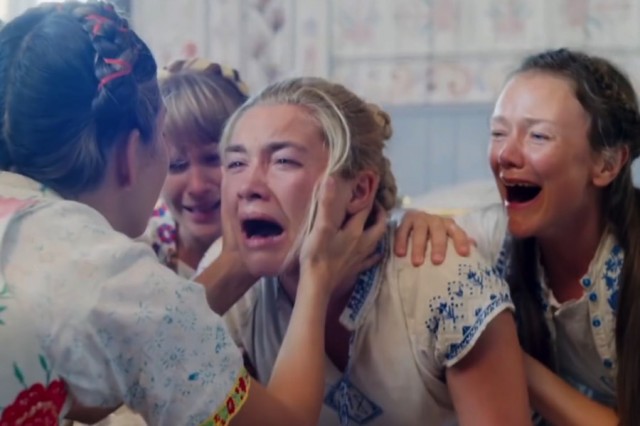Healing The Horror: A Serene Reading of Ari Aster’s Midsommar (2019)

Christopher Burns takes a breath after all the cathartic screaming and communal burning to analyse this year’s hit horror – as the 171-minute directors cut, DVD and Blu-ray are released… [WARNING: contains spoilers]
Has a filmmaker ever really captured a scream the way Ari Aster does? Aster’s first feature, Hereditary, found its most chilling moment with Toni Collette’s agonising, animalistic howl which was caused by discovering her headless daughter on the backseat of a car. The screaming in Hereditary feels like someone is trying to cough up grief or trying to force it out of themselves in a violent, demonic sort of way. Because Ari Aster is pretty good at making grief a tangible thing. The screaming in Midsommar, Aster’s latest film, is different. It’s… cathartic.
Aster’s second feature begins when Dani (Florence Pugh) suffers a devastating family tragedy. Her careless, self-absorbed boyfriend (played by Jack Reynor) belatedly, somewhat guiltily asks her to come along on a trip to a small Swedish village with his studious bros in the hope they can work on their theses. Once there they mingle with the locals and discover the commune’s ‘traditions’: suicide, murder, arson, cannibalism and really fucking weird orgies.
But back to the screams, which almost bookend the film. It’s a harmonised gushing of rage, panic and pure pain. But unlike Hereditary, where the screaming gives way to ramped up tension (and more pain), when the screaming stops in Midsommar, the film is, for brief moments, as tranquil as the blue skies that hang over what’s unfolding beneath.
The release – of all that anguish, that guilt, that grief and that hatred – is where Midsommar finds itself in a different kind of horror territory. I don’t think I’ve ever walked out of a horror film feeling the way I did as I felt with Midsommar. For a start, I initially hesitated to even call it a horror film and as I’ve thought on, I still think that but even more feverishly. Aster’s film has been labelled and sold as a horror, sure, but his film throbs with all the qualities of a melancholic drama or a break-up movie. It’s just the beats are bloody, and the denouement is fiery.

I had a lot of questions. Mainly, why did Midsommar leave me feeling at ease – with a sense of peace? And how could I turn to my friend and say ‘Wow, I feel so chill after that two and a half hour film where someone gets their face peeled off, an elderly couple get their faces bashed in and one that concludes with a pretty fucked up orgy and a communal burning’? I spent a while trying to figure it out.
As Dani watches the last piece of her world burn alive in the film’s final scene, she is horrified. Only, then she isn’t. She starts to smile, and you could study this smile. It’s one of those. It was during that Mona Lisa moment that I really found myself connected to her happiness, her relief and maybe her instability. And then I began to worry a little. Why was I so at ease with a house full of innocents burning alive? Was there something not quite right with me or had I watched the film ‘wrong’? After a while, I figured out that I wasn’t okay with that exactly. I felt the way I did because Midsommar’s biggest achievement is how it makes us really feel everything Dani feels.
When Dani screams after she finds out the news her whole family has died in horrific circumstances in the film’s devastating, but oddly beautiful, prologue, it becomes a wretch and a dry heave, and it swells with the score – for a moment it feels transcendental. It’s the first time Aster allows his main character a release. That’s when it started to click for me. As her eyes brighten and dilate with wonder as she gets to Sweden, I felt the burden of all that death lift a little. When she freaks out after taking mushrooms and the visuals literally pulsate, twirl and twist in on themselves, I sensed that death quickly return with a tormenting smirk; and when she suffers a panic attack and screams and breathes as a collective with the other girls in the commune I felt Dani’s healing process.
Because Midsommar, for all its primal and visceral moments of violence, is a movie about healing. It’s about taking the grief, the anxiety, the depression and the panic attacks and purging them. And that’s what Dani does. She untangles herself from her shitty boyfriend and his insufferable friends and, metaphorically, she kills her black dog. Is that the answer? Is watching your boyfriend burning alive while sewn into the carcass of a dead bear the way to get over your mental illness? I’m gonna go ahead and say no, probably not, but, that’s kind of incidental, because at that moment Dani’s free, she’s reborn and she’s pieced back together once more.
With Midsommar, I felt Aster was concerned with the politics of healing. That’s what this film is for me. I read a quote by Jordan Peele regarding the film’s peculiar rug pull of giving us one thing but making us feel another. Peele talks about how what he was seeing on screen wasn’t exactly congruous with how he felt, and that’s when I realised I wasn’t alone in wrestling my sense of wonder and calm with my sense of disgust. The director of Get Out and Us said: “I felt like I was being put up on this pedestal and honored through the eyes of the protagonist.
“It’s a very unique feeling for a film to conjure because after it ended, I found myself looking back at the final act like, ‘Holy shit.’ That was some of the most atrociously disturbing imagery I’ve ever seen on film, and yet I experienced it with this open-mouthed, wild-eyed gape.”
Some of our greatest moments of clarity or peace can come in pretty dark or trying times and I think Aster presents this theory with Dani. After all the death, after the maiming, the burning, the dancing, the drugs and the angst, those final moments of Midsommar are so weirdly serene. I guess the question we’re posed is ‘Has Dani gone insane or has she gained new perspective on her life and experiences?’
Self-styled as a black comedy and a mediation on a breakup, Aster’s film did leave me feeling clearer, like I had just purged a whole lot of anxiety out of my system. It felt like an ode to depression, its scars and relentlessness, but how eventually you begin to come out the other side; sometimes, in the strangest way possible.
Christopher Burns
Get the Midsommar 171-minute director’s cut when you buy the film on Apple TV
DVD and Blu-Ray available 8 October 2019; follow A24 Films for updates
Feel like purging? Win free couples therapy





